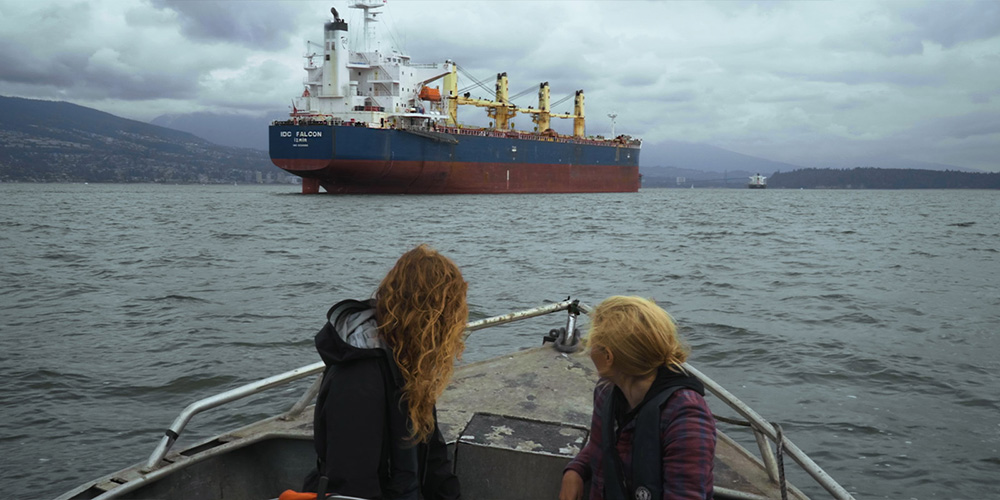Sometimes before watching a film, I undergo a bit of psychic preparation, adopting a defensive, protective posture before stepping into the experience.
It doesn’t do any good, of course. I still have to let it in. In mind and also in body, because that’s where I feel the hardest stories. A body has to exercise some care about films, balancing the need for knowledge and artfulness with how much emotional suffering can be stomached.
Thankfully, in a festival as large and accommodating as the Vancouver International Film Festival — now in its 40th anniversary year — there’s something for everyone. All shades of lightness and dark. Bit of humour here, some sadness there, and often rippled, dappled combinations of both.
The Tyee has collected just a few of the films on offer this year at VIFF, and we’ll be sharing further reviews in coming days.
Anyone who’s paid attention to the plight of the southern resident killer whales will be familiar with the systemic issues that co-directors Gloria Pancrazi and Elena Jean examine in their feature documentary Coextinction. The group of orcas known as J-Pod vaulted to worldwide attention when a killer whale mother named J35 pushed her dead calf to the surface for 17 days.
The subsequent death of another young whale, Scarlet (or J50), forms one of the film’s narrative spines — but the orcas face an ocean of problems. Noise and environmental pollution, tanker traffic, human interference, the list goes on. But none of these things quite explained the whales’ low birth rate and dwindling numbers. Eleven members of J-Pod died over the course of the film’s three-year production, and the southern resident killer whale community is now down to 73 members.
Coextinction sets out to explain everything that affects the survival of the species. Of the many issues examined, slow starvation from vanishing salmon stocks is perhaps the biggest threat. In this aspect, it isn’t simply orcas that are affected. Other species — grizzlies, eagles, wolves — are also implicated in a cascading decline. Humans also factor in. Indigenous people in B.C. have been deeply affected by declining salmon stocks.
Salmon, in turn, face a number of issues contributing to their decline. Salmon farms that dot the Pacific coast, power dams that forestall the fish from spawning, and overfishing all play a role. The film follows a somewhat circuitous route, travelling from northern B.C. to the Snake River system that traverses Washington, Oregon and Idaho. Along the way, there are interviews with Indigenous activists, whale biologists, scientists and politicians, but no one seems able to adequately address the scope and scale of the problem.
Coextinction is cut from the same cloth as a number of earlier films. Rob Stewart’s Sharkwater comes easily to mind, as does Mirjam Leuze’s The Whale and the Raven. DamNation tackled the Snake River situation a few years back.
As in these earlier films, Coextinction contains a great many treacle-slow shots of the beauty of the natural world, with special attention paid to the Salish Sea in all its dark marine beauty. It outlines the threat of increased oil tanker traffic along the B.C. coast, with its attendant noise and threat of catastrophic spills, with the construction of the Trans Mountain Pipeline expansion. Meanwhile, different governments kick the can down the road. All of this can be a little enervating, if not downright full of despair.
To its credit, Coextinction takes its lead from the two young filmmakers at its centre — earnest, well-meaning, maybe a little naive, but still trying to do the right thing. The bigger question is: will it ultimately matter? None of the information in the film is a surprise. After a while, you stop reacting. As the filmmakers say, even something as horrendous as the death of a baby whale will happen again. Whether the world will again pay a similar level of attention is hard to say.
It’s easy to feel numb when the innumerable documentaries, climate marches, worldwide protests and UN Code Reds don’t seem to change things. In most of the world, despite political promises to build back better, it’s business as usual. As Greta Thunberg rightly said, it’s all pretty words: “Blah, blah, blah.” And in the case of documentary films, pretty pictures.
There is a pattern to what are termed impact documentaries. After laying out the scale and scope of a problem, many films end with entreaty to get involved followed by a hashtag, a website or a QR code. It can become formulaic after a while.
Coextinction has the courage of its convictions, but even its two young firebrand creators seem somewhat bewildered by the lack of concrete action on the part of government and industry, who carry on like there is all the time in the world. Which, of course, there is not. Certainly not for the few remaining members of J-Pod and most likely for humans as well.
Pipelines continue to get built. Oil and gas waltz on, and hydroelectric dams squat in the middle of river systems. All the while, the innumerable studies, commissions and public feedback sessions pile up.
Coextinction strives hard to end on an anthemic note, but it rings a little hollow. You can see the confusion and grief in the eyes of the filmmakers themselves as they vow to continue fighting. But at what point does it simply become hopeless?
As an apex species, orcas have been trying to tell humans that things are very dire for a long time. But not enough people are listening. ![]()
Read more: Rights + Justice, Film, Environment

















Tyee Commenting Guidelines
Comments that violate guidelines risk being deleted, and violations may result in a temporary or permanent user ban. Maintain the spirit of good conversation to stay in the discussion.
*Please note The Tyee is not a forum for spreading misinformation about COVID-19, denying its existence or minimizing its risk to public health.
Do:
Do not: